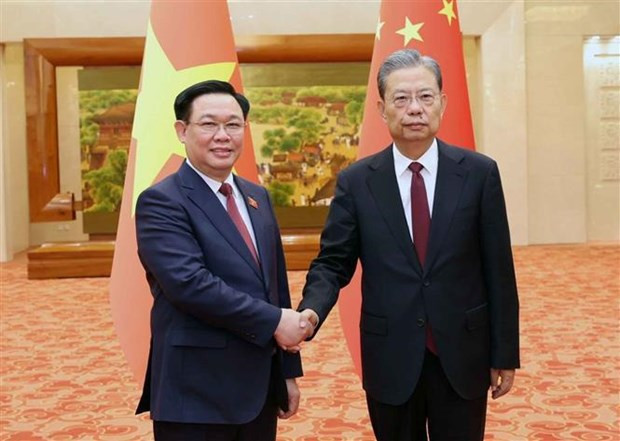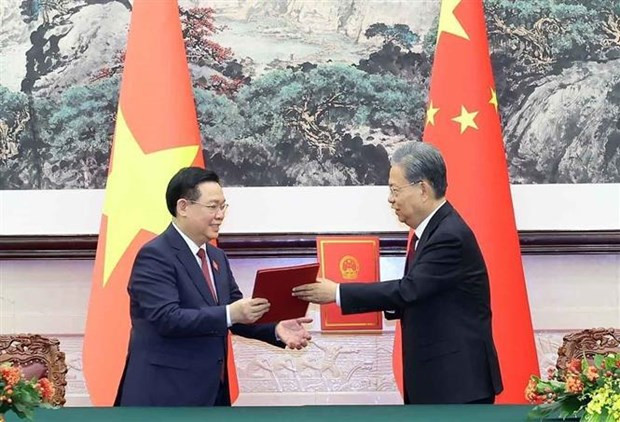
Both sides informed each other about the situation of each Party, country and activities of each legislative body. They delved deeper into discussions on specific measures to concretise the achievements and high-level common perceptions reached during Party General Secretary Nguyen Phu Trong's visit to China in November 2022 and Party General Secretary and President of China Xi Jinping's visit to Vietnam in December 2023. They also discussed measures to further enhance and deepen cooperation between the two legislatures in the coming time.
Zhao welcomed the first official visit to China by Chairman Hue in his new capacity.
They expressed their satisfaction with the positive progress in the bilateral relations between the two Parties and two countries in recent times, including the exchanges and cooperatio between the two legislatures.
NA Chairman Hue stressed that the Vietnamese Party and State particularly value the development of stable, healthy, sustainable and long-term relations with China, considering it a strategic choice and top priority in Vietnam's foreign policy of independence, self-reliance, multilateralism and diversification of ties.
China always considers Vietnam a priority in its neighbourly diplomacy policy, and consistently supports Vietnam in successfully implementing its industrialisation, modernisation and enhancing its international role, Zhao said.
The two sides vowed to effectively implement the joint statement on further deepening and elevating the comprehensive strategic cooperative partnership between the two countries, and building a Vietnam-China community with a shared future that carries strategic significance. They agreed to maintain exchanges and contacts at all levels, and boost cooperation via the Party, Government, parliament and front channels.
Hue suggested that China facilitate the early establishment of Vietnam's trade promotion offices in Chengdu (Sichuan), Haikou (Hainan), and Nanjing (Jiangsu), continue to expand imports of Vietnamese goods and agricultural products, expedite negotiations and signing of a framework agreement on rice trade, effectively build smart border gates, improve customs clearance efficiency, and facilitate Vietnamese goods transit to third country via the Asia-Europe railway route.
He wished that both sides would jointly build a new investment image of large, reputable and technologically advanced Chinese enterprises in Vietnam. He also emphasised the need for cooperation in resolving outstanding issues in certain cooperation projects, accelerating the progress of China’s non-refundable aid to Vietnam, and exploring collaboration on the construction of standard-gauge railway projects, including the Hanoi-Lao Cai, Hanoi-Quang Ninh, and Hanoi-Lang Son sections.
Zhao, for his part, spoke highly of and agreed with Hue’s recommendations to develop the ties between the two Parties and States, affirming that China stands ready to join hands with Vietnam to deepen practical cooperation, expand trade and investment collaboration, enhance strategic connectivity for development and carry out high-quality development.
He went on to say that strategic connectivity will be bolstered through the "Belt and Road" and "Two Corridors, One Belt" initiatives, with focus on developing infrastructure, roads, railways and smart border gates.
He stressed that the two sides need to enhance cooperation to ensure supply and production chains and branch out digital economy, green economy, new energy, key minerals and 5G technology.
China welcomes Vietnam’s opening of its representative agencies and trade promotion offices in its localities, he said, suggesting competent ministries and sectors of both sides work together to satisfactorily handle existing problems in cooperation projects with goodwill and constructive manner, he noted.
Besides, he held that both sides must continue popularising the sound Vietnam – China friendship.
Touching on the cooperation between the two legislative bodies, Hue recommended they enhance delegation exchanges at all levels, share experience in parliamentary activities, perfect the Parties’ leadership method, build the socialist rule-of-law States, complete mechanisms and policies for socio-economic development, and strengthen the supervisory role of the legislative bodies in urging ministries, sectors and localities to carry out the signed documents and agreements.
He said that the roles of the Vietnamese NA deputies, members of the Chinese National People’s Congress as well as members of the Vietnam – China Friendship Parliamentarians’ Group should be promoted in popularising the bilateral friendship, consolidating consensus in the people, and building a sound social foundation for the bilateral relations.
Sharing Hue’s views, Zhao expressed his delight over the robust cooperation between the two legislative bodies, and agreed to set up a cooperation committee and shape up a cooperative mechanism at the highest level, aiming at demonstrating the cooperation level between the two legislatures.
He wished that both sides will capitalise on the mechanism to enhance experience exchange in legislation work, supervision and state management to better serve the building of socialism in each country, making contributions to the Vietnam – China Comprehensive Strategic Cooperative Partnership in the coming time.
The two leaders also exchanged views on issues at sea in an open and frank manner, and concurred to continue realising the common perceptions reached by the leaders of the two Parties and States as well as properly control disagreements to maintain peace and stability in the East Sea.
Hue suggested both sides actively promote negotiation mechanisms at sea, implement agreements on the search and rescue work and set up hotlines to handle incidents arising from fishing activities towards soon signing a new fishery cooperation agreement in the Gulf of Tonkin, and work with ASEAN countries to accelerate negotiations for a practical, efficient and effective Code of Conduct (COC) in the East Sea in line with international law, including the 1982 UN Convention on the Law of the Sea (UNCLOS).
The two leaders were unanimous about maintaining coordination and cooperation between agencies of the two legislative bodies at regional and international forums.

Right after the talks, Hue and Zhao signed a new cooperation agreement between the Vietnamese NA and the National People’s Congress of China. They also witnessed the signing of another agreement between the two legislatures' offices.
Top legislator receives heads of China’s leading corporations
Chairman of the National Assembly (NA) Vuong Dinh Hue hosted separate receptions for several leaders of Chinese corporations operating in transport and energy on April 8 as part of his official trip to China.
Receiving Chairman of the Board of Directors of China Railway Construction Corporation (CRCC) Dai Hegen, and other leaders of the corporation, NA Chairman Hue recalled the visit to Vietnam in 2023 by General Secretary of the Communist Party of China Central Committee and President of China Xi Jinping, during which both sides issued a joint statement on deepening and elevating the Vietnam – China Comprehensive Strategic Cooperative Partnership, and building the Vietnam – China community with a share future.
He took the occasion to thank the CRCC for supporting Vietnam during the struggle for national independence, and spoke highly of the corporation’s capacity and operation scale across the globe.
Hue said the the joint statement in 2023 has opened up a chapter of sound collaboration for both nations. The two sides agreed to promote cross-border standard-gaud railway connection via Lao Cai – Hanoi – Hai Phong, Dong Dang – Hanoi, and Mong Cai – Ha Long – Hai Phong routes.
Seeing the infrastructure important to bolstering the bilateral economic and trade cooperation, he suggested the CRCC study and make recommendations to engage in projects in the field.
Dai, for his part, highlighted Vietnam is currently one of the most significant markets in Asia of the CRCC, adding the group, the 42nd in Fortune Global 500 list and the 12th among 500 leading firms in China, stands ready to make contributions to Vietnam’s infrastructure development, including survey and design of the railway system.
Welcoming Chairman of the China Communications Construction Company (CCCC) Wang Tongzhou, Hue hailed the CCCC’s operation amidst the global headwinds.
Vietnam is branching out its infrastructure system on the principle of promoting public-private partnership, he said, highlighting Vietnam is striving to complete the North-South expressway, Lao Cai – Hanoi – Hai Phong railway and Hanoi – HCM City railway.
He expressed his hope that the corporation will make recommendations and give technical support to Vietnam, stressing Vietnam encourages prestigious enterprises from China to join bidding for road and railway development projects in the country.
“The Vietnamese National Assembly is completing legal system, mechanisms and policies to create favourable conditions for all economic sectors to engage in transport infrastructure development in the country, comprising Chinese firms”, he underscored.
The CCCC is a comprehensive service provider of ultra-large infrastructure, mainly engaging in the investment, construction and operation of transport infrastructure, equipment manufacturing, real estate and urban development. Earning a revenue of 130.6 billion USD, it was ranked 60th in the Fortune Global 500 list in 2022.
Since 1996, the company has carried out more than 20 projects in Vietnam in the fields of infrastructure development and energy such as a part of the Hanoi – Hai Phong highway, Cai Mep – Thi Vai port, and a wind power in Soc Trang province.
The same morning, Hue received Vice Chairman of Energy China and Chairman of China International Energy Group Lu Zexiang, and leaders of member companies.
Commending the group’s effective and sustainable investment and business across the globe as well as in Vietnam, Hue welcomed its recommendations to support Vietnam in building policies and master plans on power network.
Under its national power development plan for 2021-2030 with a vision to 2050, Vietnam eyes strong energy transition from fossil fuels to renewable energy to realise its net-zero target by 2050, he said, asking the group’s leader to continue coordination with Vietnamese ministries, sectors and localities for detailed instructions.
He went on to say that the Vietnamese NA is taking bold steps in building and amending relevant policies to meet the country’s development requirements, and recognised the Energy China’s suggestions on enhancing cooperation in renewable energy and liquefied natural gas (LNG) development, and solutions to green development and carbon emission reduction.
Hue asked the Energy China to give specific recommendations to cooperate with Vietnamese firms, stressing the Vietnamese NA always accompanies the Government and competent agencies to facilitate investments of foreign firms, ensuring they do effective, successful and sustainable business in Vietnam.
In the afternoon, Hue and his entourage visited the R&D centre of Huawei, a leading global provider of ICT infrastructure and smart devices, during which he expressed his impression on the group’s development with standout inventions and patents as well as state-of-the-art technologies.
Having operated in Vietnam for more than 25 years, Huawei has made significant contributions to promoting digital transformation in the country, and begun to join in its human resources training in the hi-tech sector.
Vietnam has developed its IT enterprises while luring large foreign corporations like Huawei with a view to building a digital economy, a digital society and digital citizens, underlining the country prioritises projects with advanced, new and environmentally-friendly technologies.
The legal environment in Vietnam is becoming more complete to create the best conditions for both domestic and foreign firms, he stressed.
For his part, Huawei Chairman Liang Hua held that Vietnam has various programmes for digital transformation, and Huawei is willing to work closely with Vietnam in the areas of 5G network building and IT human resources development./.VNA